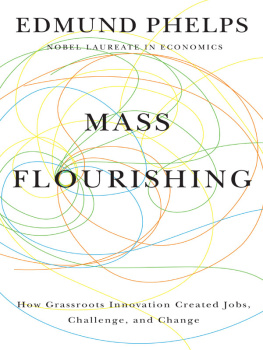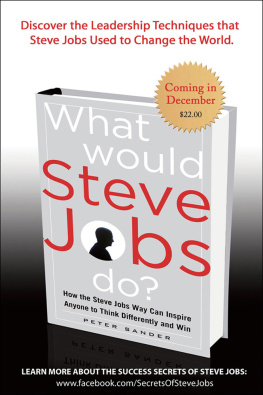Edmund S. Phelps - Mass Flourishing: How Grassroots Innovation Created Jobs, Challenge, and Change
Here you can read online Edmund S. Phelps - Mass Flourishing: How Grassroots Innovation Created Jobs, Challenge, and Change full text of the book (entire story) in english for free. Download pdf and epub, get meaning, cover and reviews about this ebook. year: 2015, publisher: Princeton University Press, genre: Politics. Description of the work, (preface) as well as reviews are available. Best literature library LitArk.com created for fans of good reading and offers a wide selection of genres:
Romance novel
Science fiction
Adventure
Detective
Science
History
Home and family
Prose
Art
Politics
Computer
Non-fiction
Religion
Business
Children
Humor
Choose a favorite category and find really read worthwhile books. Enjoy immersion in the world of imagination, feel the emotions of the characters or learn something new for yourself, make an fascinating discovery.
- Book:Mass Flourishing: How Grassroots Innovation Created Jobs, Challenge, and Change
- Author:
- Publisher:Princeton University Press
- Genre:
- Year:2015
- Rating:3 / 5
- Favourites:Add to favourites
- Your mark:
Mass Flourishing: How Grassroots Innovation Created Jobs, Challenge, and Change: summary, description and annotation
We offer to read an annotation, description, summary or preface (depends on what the author of the book "Mass Flourishing: How Grassroots Innovation Created Jobs, Challenge, and Change" wrote himself). If you haven't found the necessary information about the book — write in the comments, we will try to find it.
In this book, Nobel Prize-winning economist Edmund Phelps draws on a lifetime of thinking to make a sweeping new argument about what makes nations prosper--and why the sources of that prosperity are under threat today. Why did prosperity explode in some nations between the 1820s and 1960s, creating not just unprecedented material wealth but flourishing--meaningful work, self-expression, and personal growth for more people than ever before? Phelps makes the case that the wellspring of this flourishing was modern values such as the desire to create, explore, and meet challenges. These values fueled the grassroots dynamism that was necessary for widespread, indigenous innovation. Most innovation wasnt driven by a few isolated visionaries like Henry Ford and Steve Jobs; rather, it was driven by millions of people empowered to think of, develop, and market innumerable new products and processes, and improvements to existing ones. Mass flourishing--a combination of material well-being and the good life in a broader sense--was created by this mass innovation.
Yet indigenous innovation and flourishing weakened decades ago. In America, evidence indicates that innovation and job satisfaction have decreased since the late 1960s, while postwar Europe has never recaptured its former dynamism. The reason, Phelps argues, is that the modern values underlying the modern economy are under threat by a resurgence of traditional, corporatist values that put the community and state over the individual. The ultimate fate of modern values is now the most pressing question for the West: will Western nations recommit themselves to modernity, grassroots dynamism, indigenous innovation, and widespread personal fulfillment, or will we go on with a narrowed innovation that limits flourishing to a few?
A book of immense practical and intellectual importance, Mass Flourishing is essential reading for anyone who cares about the sources of prosperity and the future of the West.
Edmund S. Phelps: author's other books
Who wrote Mass Flourishing: How Grassroots Innovation Created Jobs, Challenge, and Change? Find out the surname, the name of the author of the book and a list of all author's works by series.











